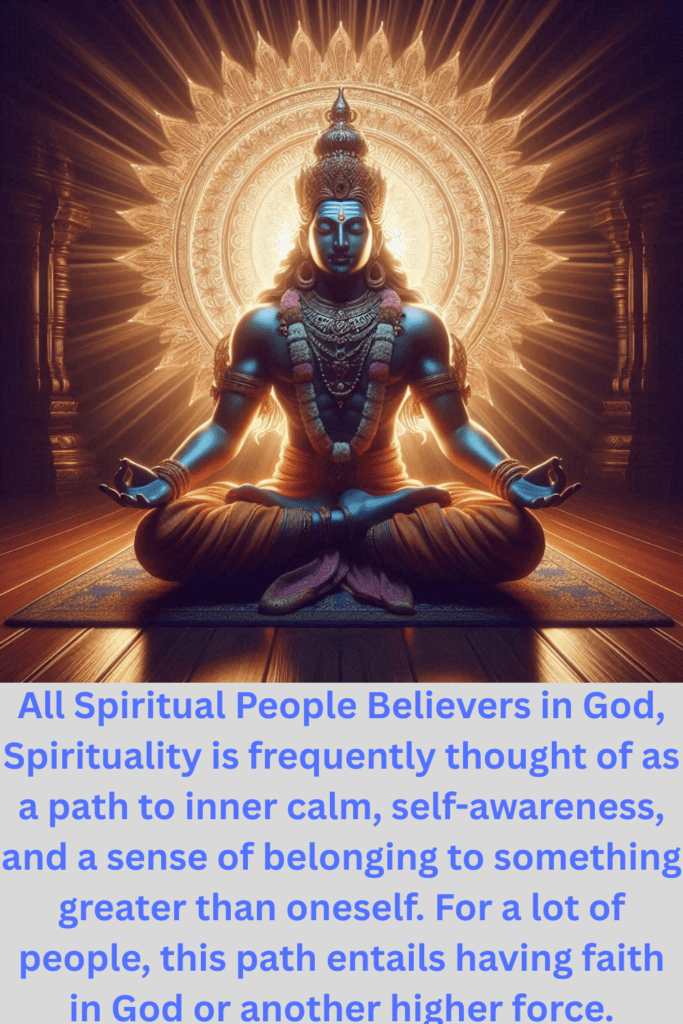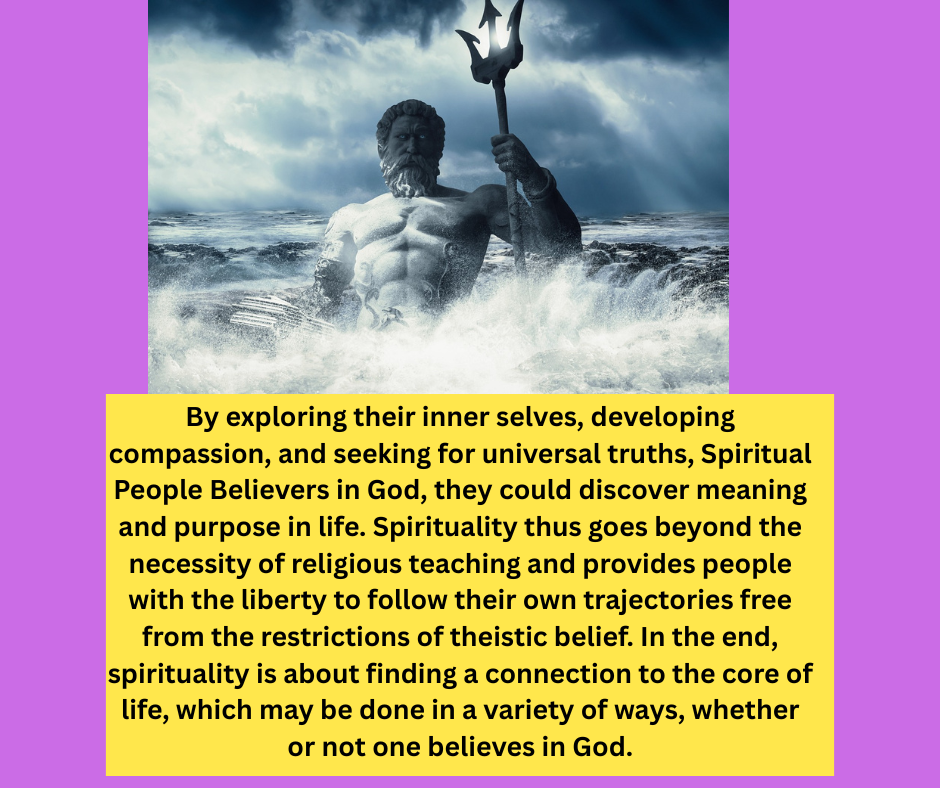All Spiritual People Believers in God, Spirituality is frequently thought of as a path to inner calm, self-awareness, and a sense of belonging to something greater than oneself. For a lot of people, this path entails having faith in God or another higher force. But not everyone who identifies as spiritual also believes in God. Many spiritual people actually find great joy, meaning, and purpose without following any theistic framework. This brings up a crucial query: why do not all spiritual individuals believe in God?

Table of Contents
There are a number of philosophical, psychological, cultural, and individual reasons for the gap between spirituality and faith in God. Many individuals may not feel the need to incorporate the idea of God into their spiritual practices, and people’s spiritual experiences and journeys might vary widely. By investigating this phenomenon, we can learn why some spiritual people reject or do not require a believe in God in order to pursue a life that is profoundly spiritual.
The Diversity of Spiritual Paths
The term “spirituality” refers to a wide range of activities, viewpoints, and experiences. It frequently focuses on self-discovery, meaning-seeking, and figuring out one’s role in the world. Spirituality is more flexible and individualized than religion, which is frequently based on predetermined ideas and prescribed rituals. Depending on the needs, experiences, and worldview of the individual, it might take on several shapes.
Spiritual People Believers in God,Some people might not believe in a personal God or a higher force in order to be spiritual. Practices like mindfulness, yoga, meditation, and other self-discovery methods that don’t require a believe in God appeal to a lot of individuals. Developing inner peace, emotional equilibrium, and increased self-awareness are the main goals of these activities, all of which support spiritual development.
Philosophies like existentialism, humanism, and some schools of Buddhism emphasize how each person must give their life meaning and purpose. Rather than any notion of a god, these frameworks place more emphasis on human potential, self-improvement, and awareness. Rather than pursuing a relationship with a heavenly being, spirituality in this context refers to living in accordance with one’s ideals and connecting with one’s inner self.
Spirituality and the Search for Inner Peace
Inner serenity and personal development are the main concerns of many spiritual people. Belief in God is not necessary to achieve these objectives. For instance, spiritual individuals frequently practice meditation to attain a condition of peace and self-awareness.
Concentrating, calming the mind, and allowing oneself to be in the present are all part of meditation. Spiritual People Believers in God ,It can be a profoundly transforming spiritual practice that improves mental clarity, lowers stress levels, and improves emotional well-being.
Many spiritual people who may not believe in God practice meditation, despite its roots in religious traditions like Buddhism and Hinduism. Finding calm inside oneself and developing a profound sense of peace are the goals of meditation in this setting, not attaining a spiritual connection.
A common theme in spiritual traditions that emphasize human development and well-being is self-actualization. Realizing one’s full potential, or self-actualization, is the ultimate goal of Abraham Maslow’s hierarchy of needs. Spiritual people may work toward this objective independently of God, concentrating instead on personal development, emotional recovery, and discovering their actual calling.
The Influence of Secular and Humanistic Philosophies
Many people nowadays have a preference for secular or humanistic worldviews that do not include faith in God. People can explore their spirituality in a way that is unrestricted by religious teaching thanks to secularism, Spiritual People Believers in God,which supports the separation of religion and public life.
Despite not belonging to any particular religious tradition, a large number of spiritual people nowadays undertake spiritual activities like yoga, mindfulness, or in-depth introspection on their own personal development.
A philosophical position known as humanism, which prioritizes human values, reason, and ethics over religious convictions, also provides a foundation for spirituality without of God. Humanists hold that people can live morally upright lives because they are rational, compassionate, and motivated to further human flourishing.
Their emphasis is on spiritual goals like social justice, empathy, and kindness, without necessarily attributing these ideals to a higher force. These secular and humanistic traditions do not view spirituality as a relationship with a heavenly being, but rather as a means of connecting with oneself, others, and the world. Following these philosophies does not require one to believe in God in order to lead a purposeful or happy spiritual existence.
Non-Theistic Religions and Spirituality
Certain spiritual people are drawn to non-theistic philosophies or faiths that do not necessitate faith in a divine being. One spiritual approach that does not entail faith in a creator God is Buddhism.
Although some schools of Buddhism have gods, the main ideas emphasize enlightenment for the individual via meditation, mindfulness, and an awareness of the nature of suffering. The Buddha was a teacher who demonstrated the way to inner peace and liberation; he never professed to be a god.
In a similar vein, belief in a personal God is not crucial to Taoism, an ancient Chinese philosophy and spiritual tradition. Taoism revolves around the idea of the Tao, which is the universe’s inherent order. Taoists do not worship a god; instead, they strive to live in harmony with the Tao and the natural flow of existence. Taoist spiritual disciplines like Qigong and Tai Chi emphasize balance and the development of life energy (Qi), not worship of a deity.
Spiritual pathways that emphasize self-awareness, personal growth, and connection to the outside world are offered by Buddhism, Taoism, and other non-theistic ideologies. As demonstrated by these traditions, Spiritual People Believers in God,one can live a spiritual life without having to believe in God.
Rejection of Religious Dogma and Doctrine
Rejecting organized religion and its doctrine is another reason why some spiritual people do not believe in God. Many spiritually nonreligious (SBNR) people feel cut off from traditional religious organizations because they believe they are inflexible, judgmental, or hypocritical. Others see religion as a system of oppression that hinders individual inquiry and promotes conformity.
These people may reject the notion of a personal God in favor of a more customized approach to spirituality, and they may look for spirituality outside of official religious organizations. Spiritual People Believers in God,Without following a religion’s mandated beliefs or rituals, they could embrace spiritual exploration techniques like self-reflection, connecting with nature, or artistic expression.
In this way, spirituality is liberated from institutional restraints and becomes a subjective and individual journey. Without feeling pressured to embrace a higher power or deity, people who reject religious orthodoxy frequently feel liberated to develop their own spiritual practices and beliefs that speak to their own experiences.
The Search for Universal Truths and the Mystical Experience
The desire to discover universal truths about the nature of life, awareness, and the world, as well as to investigate the mysteries of existence, motivates a lot of spiritual people. Mystic experiences, which might arise from meditation, altered states of consciousness, or in-depth introspection, are frequently the result of this investigation.
A direct encounter with the divine, a profound sense of oneness with the cosmos, or a sense of interconnection may all be part of these experiences. But the belief in a personal God is not necessarily necessary for these mystical experiences.
Without attaching it to a deity, some people view the mystical experience as a means of connecting to a cosmic force or a greater truth. The event itself is regarded as a spiritual awakening or revelation that sheds light on the essence of the self and existence. Spiritual People Believers in God, Whether or whether one believes in God, having mystical experiences can result in a greater awareness and a feeling of profound contentedness to the world.
Conclusion
Belief in God is not usually a prerequisite for spirituality, which is a very personal path. Spirituality can take many different forms, some of which do not involve belief in a deity, but religion frequently revolves around devotion to a higher force. Those who are spiritual but do not believe in God can use techniques like mindfulness, meditation, or philosophical study to achieve inner peace, personal development, and self-awareness.
By exploring their inner selves, developing compassion, and seeking for universal truths, Spiritual People Believers in God, they could discover meaning and purpose in life. Spirituality thus goes beyond the necessity of religious teaching and provides people with the liberty to follow their own trajectories free from the restrictions of theistic belief. In the end, spirituality is about finding a connection to the core of life, which may be done in a variety of ways, whether or not one believes in God.
